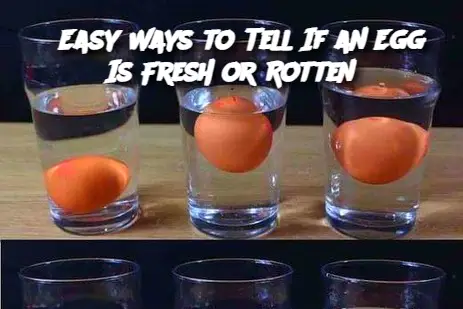Introduction: Eggs are a staple in many kitchens, prized for their versatility, affordability, and nutritional value. However, they do have a shelf life, and sometimes, it’s hard to know whether they’re still good to eat or if they’ve gone bad. In this article, we’ll guide you through five simple and effective methods to determine whether your eggs are fresh or rotten. These tips will help you avoid any unpleasant surprises and ensure you’re cooking with the best quality eggs every time.
Ingredients:
Eggs (fresh or suspected of being spoiled)
A bowl of water (for the water test)
A small spoon (optional for the smell test)
Instructions:
The Water Test: One of the easiest and most reliable ways to check an egg’s freshness is the water test. Here’s how it works:
Fill a bowl with cold water and gently place the egg into the bowl.
Fresh eggs will sink and lay flat on the bottom.
Eggs that are still good but a little older will stand upright on the bottom or tilt slightly.
Eggs that float are no longer fresh and should be discarded. The reason eggs float is due to the air pocket inside, which increases as the egg ages.
The Shake Test: If you’re unsure about an egg’s freshness, give it a gentle shake. Hold the egg close to your ear and shake it lightly. If the egg makes a sloshing sound, this means the egg has gone bad because the yolk and white have started to break down. A fresh egg will not make this noise.
The Smell Test: A rotten egg will emit a very strong, sulfurous odor, which is a clear indication that it should be discarded. To perform this test, crack the egg open on a clean plate or bowl. If it smells off, throw it away. Even if it looks okay, the smell will tell you the truth. Fresh eggs have very little to no odor.
The Visual Test: Inspect the egg’s shell closely. Fresh eggs should have a clean, smooth shell. If you see cracks or any slimy or powdery spots, this could be a sign of contamination. Additionally, once the egg is cracked open, check for any discolored spots in the egg white or yolk. A fresh egg will have a clear, firm white and a bright yellow yolk. Any unusual discoloration or a watery consistency in the white can be a sign the egg is spoiled.
The Expiration Date Check: While not always foolproof, checking the expiration date on the egg carton can give you a general idea of the egg’s freshness. However, it’s important to note that eggs can still be good for a period after this date if stored properly. Therefore, it’s best to use the other methods mentioned here in conjunction with the expiration date.
Serving and Storage Tips:
Serving Tips: Always crack eggs into a separate bowl before adding them to a recipe, especially if you’re unsure of their freshness. This helps avoid contamination of the entire dish if the egg is bad.
Storage Tips: Store eggs in their original carton in the coldest part of the refrigerator (usually toward the back). This will help maintain their freshness for up to 3-5 weeks after purchase. Always keep eggs refrigerated, as leaving them at room temperature can cause bacteria to multiply quickly.
Variations:

